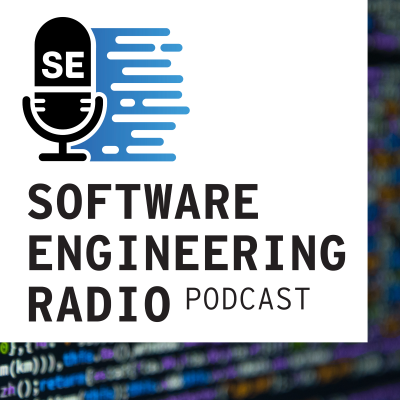
Software Engineering Radio - the podcast for professional software developers
inglés
Tecnología y ciencia
Empieza 7 días de prueba
$99 / mes después de la prueba.Cancela cuando quieras.
- 20 horas de audiolibros al mes
- Podcasts solo en Podimo
- Podcast gratuitos
Acerca de Software Engineering Radio - the podcast for professional software developers
Software Engineering Radio is a podcast targeted at the professional software developer. The goal is to be a lasting educational resource, not a newscast. SE Radio covers all topics software engineering. Episodes are either tutorials on a specific topic, or an interview with a well-known character from the software engineering world. All SE Radio episodes are original content — we do not record conferences or talks given in other venues. SE Radio is brought to you by the IEEE Computer Society and IEEE Software magazine.
Todos los episodios
880 episodiosSE Radio 698: Srujana Merugu on How to build an LLM App
In this episode of Software Engineering Radio, Srujana Merugu, an AI researcher with decades of experience, speaks with host Priyanka Raghavan about building LLM-based applications. The discussion begins by clarifying essential concepts like generative vs. predictive AI, pre-training vs. fine-tuning, and the transformer architecture that powers modern LLMs. Srujana explains diffusion models and vision transformers, highlighting how multimodal AI is reshaping content creation. The conversation then moves to practical aspects—where LLMs make sense, where they don't, and a decision framework for evaluating use cases. They explore common application patterns such as retrieval-augmented generation (RAG) and agentic architectures, breaking down components like planners, orchestrators, memory, and tools. Key considerations for model selection, evaluation metrics, and safety guardrails are discussed in depth. The episode also touches on prompting strategies, automated prompt optimization, and emerging trends like multi-sensory AI and the "Internet of Senses." Finally, Srujana shares tips on staying current in a fast-moving AI landscape and emphasizes lifelong learning and curated knowledge sources.
SE Radio 697: Philip Kiely on Multi-Model AI
Philip Kiely, software developer relations lead at Baseten, speaks with host Jeff Doolittle about multi-agent AI, emphasizing how to build AI-native software beyond simple ChatGPT wrappers. Kiely advocates for composing multiple models and agents that take action to achieve complex user goals, rather than just producing information. He explains the transition from off-the-shelf models to custom solutions, driven by needs for domain-specific quality, latency improvements, and economic sustainability, which introduces the engineering challenge of inference engineering. Kiely stresses that AI engineering is primarily software engineering with new challenges, requiring robust observability and careful consideration of trust and safety through evals and alignment. He recommends an approach of iterative experimentation to get started with multi-agent AI systems. Brought to you by IEEE Computer Society [https://www.computer.org/] and IEEE Software magazine [https://www.computer.org/software].
SE Radio 696: Flavia Saldanha on Data Engineering for AI
Flavia Saldanha, a consulting data engineer, joins host Kanchan Shringi [https://se-radio.net/team/kanchan-shringi/] to discuss the evolution of data engineering from ETL (extract, transform, load) and data lakes to modern lakehouse architectures enriched with vector databases and embeddings. Flavia explains the industry's shift from treating data as a service to treating it as a product, emphasizing ownership, trust, and business context as critical for AI-readiness. She describes how unified pipelines now serve both business intelligence and AI use cases, combining structured and unstructured data while ensuring semantic enrichment and a single source of truth. She outlines key components of a modern data stack, including data marketplaces, observability tools, data quality checks, orchestration, and embedded governance with lineage tracking. This episode highlights strategies for abstracting tooling, future-proofing architectures, enforcing data privacy, and controlling AI-serving layers to prevent hallucinations. Saldanha concludes that data engineers must move beyond pure ETL thinking, embrace product and NLP skills, and work closely with MLOps, using AI as a co-pilot rather than a replacement. Brought to you by IEEE Computer Society [https://www.computer.org/] and IEEE Software magazine [https://www.computer.org/software].
SE Radio 695: Dave Thomas on Building eBooks Infrastructure
Dave Thomas, author of The Pragmatic Programmer, The Manifesto for Agile Software Development, Programming Ruby, Agile Web Development with Rails, Programming Elixir, Simplicity, and co-founder of the Pragmatic Bookshelf, speaks with SE Radio host Gavin Henry [https://se-radio.net/team/gavin-henry/] about building infrastructure for eBooks. They discuss what an eBook is, the various formats, what infrastructure is needed to build them, how an author writes an book, the history of the Pragmatic Bookshelf, how they have evolved, how to handle links within eBooks, why humans are so important in the writing process, and why AI can help with your writing -- once you've written your content. Thomas discusses PDFs, eBooks, Mobi files, ePub files, CI/CD pipelines, WYSWYG, Markdown files, Pragmatic Markup Language, embedding code, AI agents, images, printing PDFs, JVMs, Java, jRuby, and how Markdown won the plain text writing format wars. Brought to you by IEEE Computer Society [https://www.computer.org/] and IEEE Software magazine [https://www.computer.org/software].
SE Radio 694: Jennings Anderson and Amy Rose on Overture Maps
Jennings Anderson, a Software Engineer with Meta Platforms, and Amy Rose, the Chief Technology Officer at Overture Maps Foundation, speak with host Gregory M. Kapfhammer about the Overture Maps project, which creates reliable, easy-to-use, and interoperable open map data. After exploring the foundations of geospatial information systems, Gregory and his guests dive deep into the implementation of Overture Maps through features like the Global Entity Reference System (GERS). In addition to discussing the organizational structure of the Overture Maps Foundation and the need for a unified database of geospatial data, Jennings and Amy explain how to implement applications using data from Overture Maps. Brought to you by IEEE Computer Society [https://www.computer.org/] and IEEE Software magazine [https://www.computer.org/software].
Elige tu suscripción
Premium
20 horas de audiolibros
Podcasts solo en Podimo
Podcast gratuitos
Cancela cuando quieras
Empieza 7 días de prueba
Después $99 / month
Empieza 7 días de prueba. $99 / mes después de la prueba. Cancela cuando quieras.























